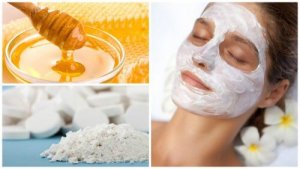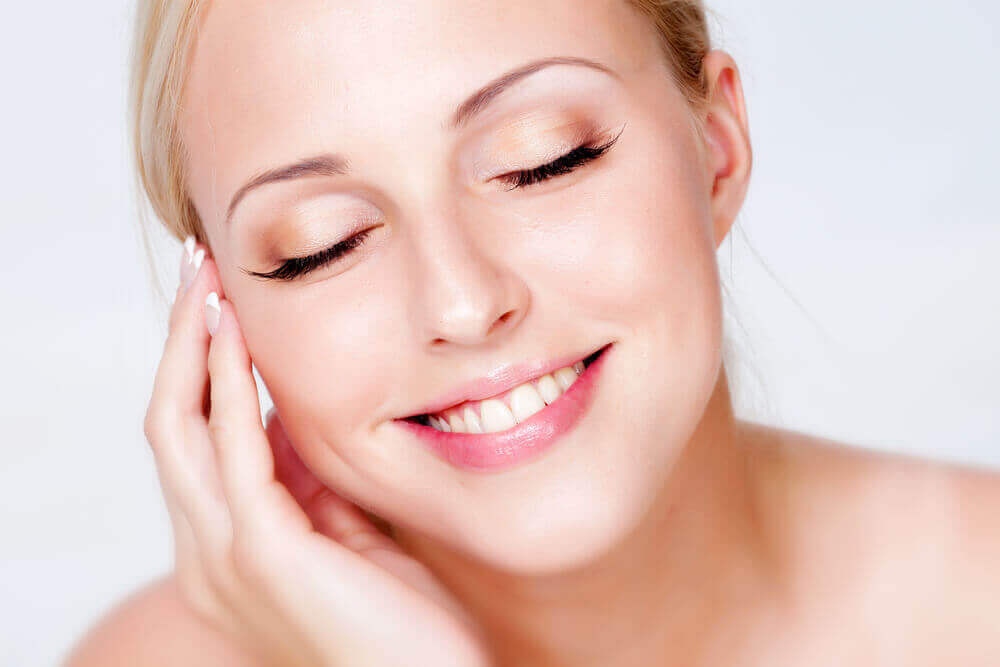Discover What Happens on Your Face when You Use an Aspirin-Honey Face Mask


Reviewed and approved by the doctor Karla Henríquez
In recent years, the mixture of honey and aspirin has become popular as an alternative to promote skin health, especially in people who tend to suffer from acne. Thanks to the properties of these ingredients, the mixture reduces excess oil, the presence of dead cells and impurities that can affect the appearance of your skin. Would you like to try an aspirin-honey face mask?
Using an aspirin-honey face mask to care for your skin
Aspirin is a painkiller that’s sold everywhere. It calms headaches, muscular tension, and helps with circulatory problems. What some don’t know is that aspirin has compounds that help your skin. This is especially true for the skin around your face.
This is due to its high concentration of a fat-soluble hydroxy acid. This acid is used to make many healing creams, exfoliants, and other products.
According to information published in Clinical, Cosmetic and Investigational Dermatology, formulations with these components are being used in concentrations ranging from 2 % to 70 % to treat acne, ichthyosis, keratosis, warts, psoriasis, photoaged skin and other skin disorders.
The above is reinforced by another study published in 2015, which concludes that salicylic acid can help dermatological and cosmetic problems, including acne vulgaris, melasma, photodamage, freckles and lentigines.
Meanwhile, honey is one of the natural ingredients with the most applications in cosmetics. According to a review published in the Journal of Cosmetic Dermatology, it contains proteins and amino acids, vitamins, enzymes, minerals and other components that promote skin health.
Specifically, it can be useful in promoting healing, preventing skin infections, increasing hydration and preventing premature signs of aging. Would you like to try this treatment? Let’s take a look at the recipe.
If you have sensitive skin, read this: Homemade Makeup Remover for Sensitive Skin
Recipe for aspirin-honey face mask

This peeling face mask is easy and inexpensive to make. The only thing you need to pay attention to is the origin of the honey you use. Organic honey will give you the most benefits.
Also, keep in mind that it is a complementary treatment and should not replace any recommended by your dermatologist. If possible, you should consult a professional before using it, especially if you have sensitive skin. In the case of a bad reaction, discontinue use.
Read more about other skin products: 7 Organic Skin Care Products
Ingredients
- 4 aspirin tablets
- 2 (50 g) tablespoons of organic honey
- 1 (10 ml) tablespoon of water
- 5 drops of vitamin E (optional)
Instructions
- Put the aspirin in a mortar and grind to a fine powder.
- Add the water and mix until you have a thick paste.
- Mix in the organic honey with a spoon.
- Once you get a smooth consistency, you are finished.
- As an additional option, you can add the vitamin E at the end.
Application
- Before putting on the mask, wash your face. This should be done with lukewarm water and a neutral soap. Make sure to remove any makeup with a cleansing milk or oil.
- When you’re ready, take the amount of cream you will need. Then, rub it all over your face. Be careful when applying it around your mouth and eyes.
- If possible, rub the mask down to your neck to get better results.
- Massage for 3 minutes. Let the mask work for another 10 minutes.
- When time is up, rinse your face with lukewarm water.
- Finish the treatment with a moisturizer. When you begin to use this, you can repeat this aspirin-honey face mask 2 or 3 times a week. After that, once a week is enough.
You’ll immediately feel cleaner, smoother, and renewed skin. Also, when you keep using the cream, you’ll notice other effects.

Take care!
Before you use the cream on your whole face, first try testing the cream on a small area. This is important because it can let you know about any reactions you could have. Usually, this cream doesn’t cause any unwanted side effects. That being said, we can’t rule out the possibility of an unwanted reaction with some skin types.
If you notice any signs of a skin disease, avoid using these treatments and see a dermatologist. A professional will be able to indicate an appropriate treatment according to the type of problem.
All cited sources were thoroughly reviewed by our team to ensure their quality, reliability, currency, and validity. The bibliography of this article was considered reliable and of academic or scientific accuracy.
- Kornhauser A, Coelho SG, Hearing VJ. Applications of hydroxy acids: classification, mechanisms, and photoactivity. Clin Cosmet Investig Dermatol. 2010;3:135–142. Published 2010 Nov 24. doi:10.2147/CCID.S9042
- Arif T. Salicylic acid as a peeling agent: a comprehensive review. Clin Cosmet Investig Dermatol. 2015;8:455–461. Published 2015 Aug 26. doi:10.2147/CCID.S84765
- McLoone, P., Oluwadun, A., Warnock, M., & Fyfe, L. (2016). Honey: A Therapeutic Agent for Disorders of the Skin. Central Asian Journal of Global Health. https://doi.org/10.5195/cajgh.2016.241
- Burlando, B., & Cornara, L. (2013). Honey in dermatology and skin care: A review. Journal of Cosmetic Dermatology. https://doi.org/10.1111/jocd.12058
This text is provided for informational purposes only and does not replace consultation with a professional. If in doubt, consult your specialist.








